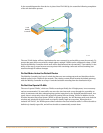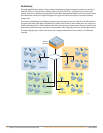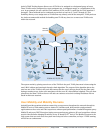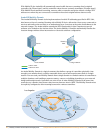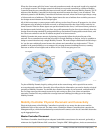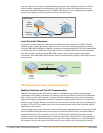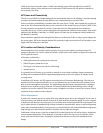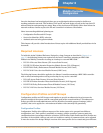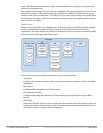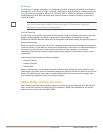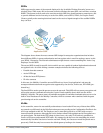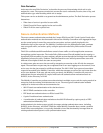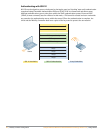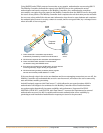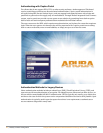
Campus Wireless Networks Validated Reference Design Version 3.3 | Design Guide Mobility Controller Configuration | 37
Chapter 6
Mobility Controller
Configuration
Once the hardware has been deployed there are several design decisions required to build out a
working production network. This includes VLAN and IP network design, as well as the loop back IP
address selection and spanning tree usage. Many of the decisions will logically follow from where the
network architect chooses to place the AP and controller in relation to one another.
Other items needing additional planning are:
z Configuration Profiles and AP Groups
z Service Set Identifier (SSID) selection
z Authentication and encryption methods
This chapter will provide a brief introduction of these topics with additional detail provided later in the
document.
Required Licenses
To build this Aruba Validated Reference Design for a large Campus as described in Chapter 4 on
page 19, the following licenses are required on the Local Controllers, assuming an MMC-6000
Multiservice Mobility Controller is acting as a backup to a second MMC-6000:
z LIC-512-AP Access Point License (512 Access Point License)
z LIC-WIP-512 Wireless Intrusion Protection Module License (512 AP Support)
z LIC-PEF-8192 Policy Enforcement Firewall Module License (8192 Users)
z LIC-VOC-8192 Voice Services Module License (8192 Users)
The following licenses should be applied to the Master Controllers assuming a MMC-3600 controller
with no APs terminating and not acting as a backup for any active controller:
z LIC-8-AP Access Point License (8 Access Point License)
z LIC-WIP-8 Wireless Intrusion Protection Module License (8 AP Support)
z LIC-PEF-128 Policy Enforcement Firewall Module License (128 Users)
z LIC-VOC-128 Voice Services Module License (128 Users)
Configuration Profiles and AP Groups
Configuration profiles and AP Groups work together to provide an abstraction layer between the
physical settings of the system, and the conceptual goals of the network architect. This abstraction
feature provides the Aruba administrator with the benefits of reusable groups of settings (called
‘profiles’) that can be applied in a mix-and-match fashion with extremely fine granularity.
Configuration Profiles
Configuration Profiles allow different aspects of the Aruba system to be grouped into different
configuration ‘sets’. Each profile is essentially a container, and the container creates a particular
configuration based on settings within the container. SSID Profiles, Radio Profiles and AAA Profiles are
just some of the available choices; and each one includes a number of parameters that can be adjusted
to meet the needs of the design. Multiple versions of the same profile can be created and given different



